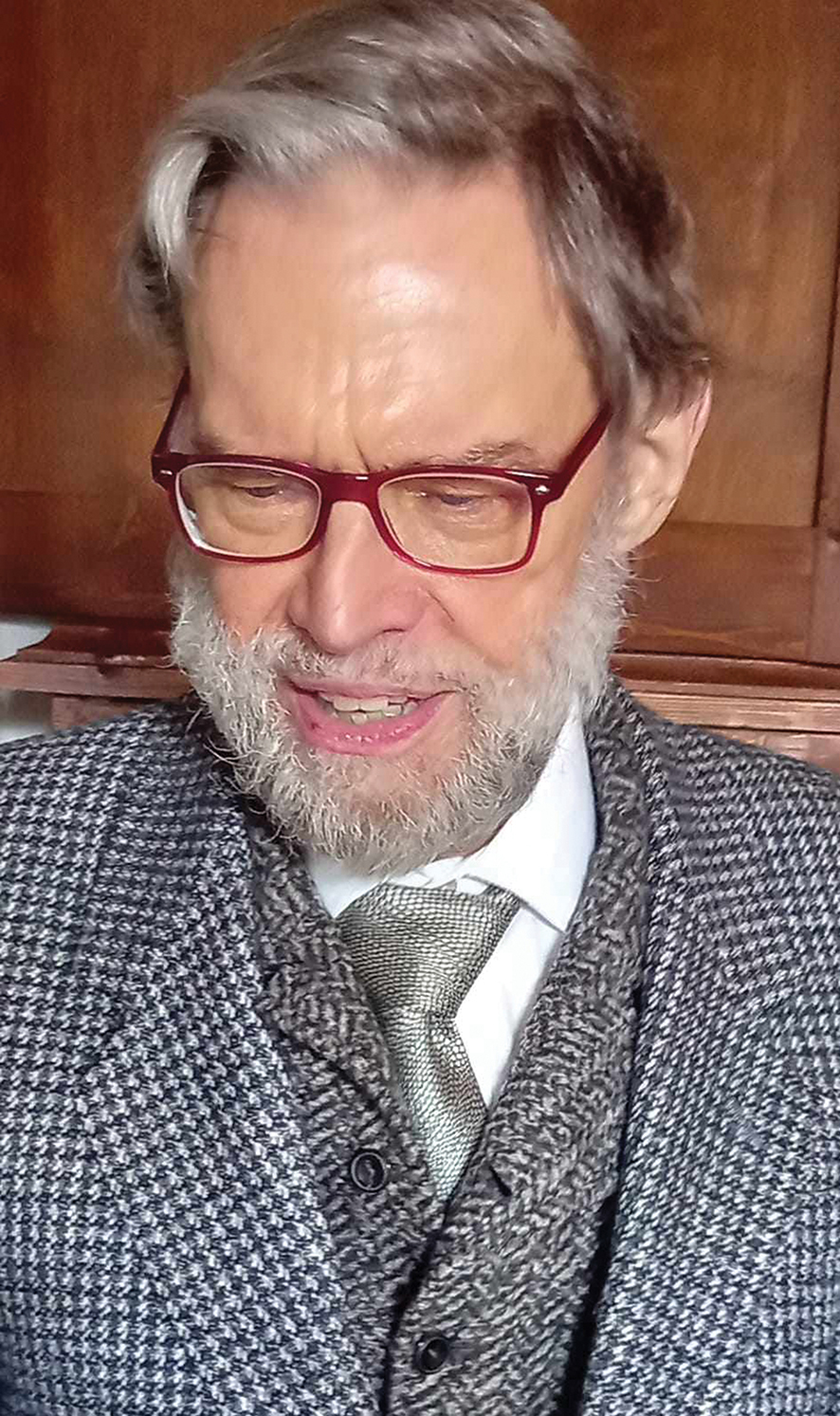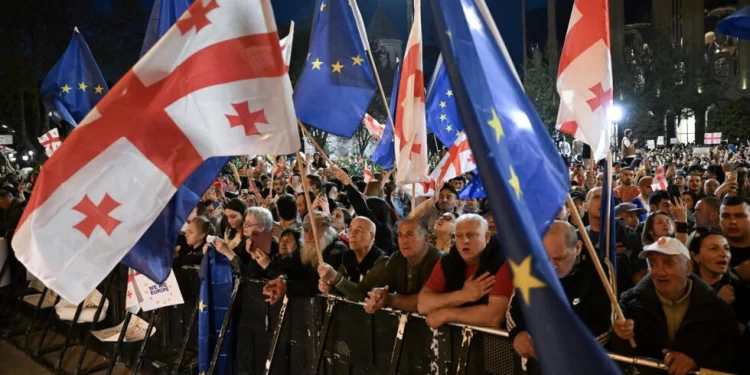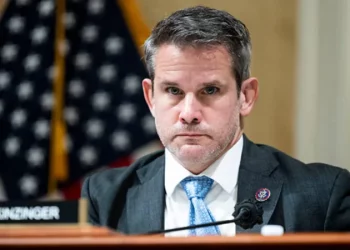Professor Charles H. Fairbanks, Jr. has been living in Tbilisi since 2006, where he works as Professor of Soviet and Post-Soviet systems at Ilia State University. Fairbanks is a senior fellow at the Hudson Institute and previously served as a research professor of international relations and the director of the Central Asia-Caucasus Institute at Johns Hopkins University’s School of Advanced International Studies. He served as a deputy assistant secretary in the U.S. Department of State and a member of the department’s policy planning staff. Fairbanks has also taught on the political science faculty of both Yale University and the University of Toronto. Radio Free Europe/RL’s Georgian Service sat down with him this week to discuss Georgia’s shaky trajectory westwards, and the big personalities involved on the way.
How would you assess the situation Georgia finds itself in today, both politically and domestically?
Internationally, Georgia, which once was moving slowly, and with interruptions, but continuously towards Europe, seems to be drifting somewhere between Europe and Russia. And domestically an important election is about to happen, which will test the survival of democracy in Georgia. These are trying times for the country.
In an interview some seven years ago, you said Georgia’s Western direction had tremendous momentum. What do you think went wrong?
I think it’s a general problem for most post-communist governments, except the Baltics, that the governments don’t want to give up power. They are very tempted towards the abolition of democracy after they have ruled for a time, and democracy gradually becomes less and less appealing to them. And that is now true of Georgia too.
Both the UNM and Georgian Dream governments were democratic, but they both decayed
We need to ask you about this hotly-debated “Foreign Agents” law that the government is trying to pass. What’s your take on it?
This law that the Georgian government wants to pass has tremendously destructive potential. And it’s important to this debate, I think, to say that when the American law was passed by Congress, the obvious cause of the law was the rise of totalitarianism in Europe, first Soviet communism, then Italian fascism, then German fascism. The American foreign agents’ registration law was meant to deal with that problem. So, to use that analogy today with the Georgian law is just wrong. There is also a very key difference between the American law and the Georgian law, which is that the Georgian law explicitly includes the media, newspapers, television, even the internet, if it’s in the Georgian language, whereas the media was never included in the American foreign agents’ registration law, if it was at least 80% American-owned.
We last spoke a year after the 2012 governmental change. You said it was being decided whether Georgia had managed to become a consolidated democracy, and whether it was ready to learn from its mistakes. Did it?
Well, I think originally, it did. Both the UNM government and the Georgian Dream government were, broadly speaking, democratic. But they both decayed. And the degree of control that citizens had over their government was so limited that the loss of democracy in the old age of those two governments couldn’t easily be controlled by the public. And that’s the situation we’re facing now.

You say we are bracing for crucial elections. In 2016, you predicted Georgian Dream would be in trouble when it came to the elections. Do you still think so?
Yes, and it’s true of any government. I was an American government official, for roughly four runs, four steps up the ladder below the president. And I noticed it in the second term of the Reagan administration: It was worn out and lacked any vigor or sense of direction. And I think that has happened to Georgian Dream as well- its officials are tired and there’s a lack of clear direction now. But what is clear is the personal interests of people who don’t want to lose power and the access that gives them to money.
The President’s rebellion against Georgian Dream is a natural one
You often lament the fact that georgia has failed to have genuinely party-driven politics, that it is still all about personalities. You said President Margvelashvili was like Icarus, trying to fly with wings not of his own making. What do you say of our current president?
She was essentially chosen by Bidzina Ivanishvili. She didn’t have a political position that would have brought her to the presidency without him. But I think she was genuinely shocked by the turn away from Europe, because she is both a Georgian and a European by the complexity of history, which made her ancestors flee to France. And so I think her rebellion against Georgian Dream is a natural one, and to be expected.
You told me Ivanishvili showed no signs of wanting to cling to power and rule from behind the scenes after he resigned from being Prime Minister the first time. Has your view of him changed?
It has. He clearly wants to continue being the ultimate source of authority in the Georgian government. He doesn’t want to administer the country day to day, the way Vladimir Putin does, he’s certainly not a tyrant in that sense. One of the problems with the Georgian government today is that decisions are made very slowly, because Ivanishvili isn’t following the government’s activities day to day: He just suddenly intervenes on important issues, but these often lack a context that would make them sensible.
As a scholar of statecraft, how would you characterize that kind of rulership? Is it still democracy?
I would say it’s a democracy in which the sovereignty of the people is diluted or weak. There are many people who still revere and support Ivanishvili, who are not necessarily anti-democratic, but as his period of domination in Georgian politics grows old, it’s a big question how to continue with it in a democratic way. The anti-Western tone is very threatening to democracy, because the prestige of the West is still very important support for the degree of democracy that Georgia has. And from that perspective, I see the Georgian law on transparency of foreign agents as a huge threat to democracy.
You told me in 2013 that Mikheil Saakashvili was “a tragic figure, a prisoner of a trap of his own making”. Now he’s quite literally a prisoner. What’s your take on the fate that has befallen him?
Well, it’s very sad. I think he was the real hero in Georgian history for a while, but, unfortunately, he really did things as president that were illegal, and that certainly were shocking, like the treatment of Girgvliani. Even in Western democracies, we don’t quite know how to deal with that kind of situation. Richard Nixon was the popular president, who, in a free election beat an unpopular president, but who also broke the law. How to handle that is a problem. It’s a problem now with ex-President Trump.
In 2013, you accurately predicted Georgia’s fate for the following decade. How do you see the next decade for Georgia?
Well, I think there are very contrary tendencies. Ever since Sulkhan-Saba Orbeliani took ship for Rome and Paris, there has been a very powerful Georgian attraction to Europe. And it still dominates in the feelings of the majority of Georgians, though not all Georgians.
On the other hand, the way Georgian Dream is now changing in the context of the war with Ukraine is very, very dangerous to the sovereignty and freedom of Georgia. If Putin really wins the Ukraine war in the sense of being able to annex a substantial part of Ukraine, and to create instability in Kyiv to a degree that Ukraine can’t any longer seize independence, I don’t see how Georgia can prevent being sucked into the position of Belarus or Tajikistan, which are nominally independent countries, but which depend on Russia on crucial issues; where what Russia says, goes, even if they don’t want to. There is a real danger of the loss of Georgia’s sovereignty. And I believe it can be maintained only by democracy.
Interview by Vazha Tavberidze













